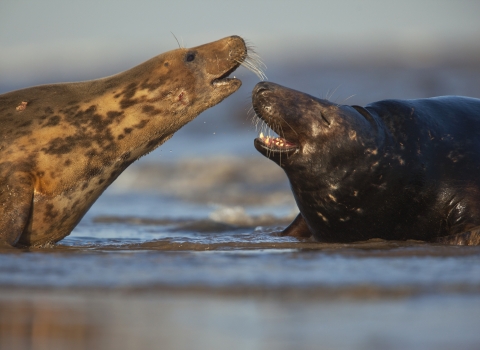All about seals
Grey seals can be seen almost anywhere along the coast of North Wales bobbing around on the surface of the water or in some places found in large numbers hauling out onto the coast to rest, pup or moult. They are the largest of the two species of seals seen around the UK - the other being the common seal, which are not actually that common around North Wales. Our coastal waters are important for this incredible species for many stages of their life-cycle.
Here at North Wales Wildlife Trust we receive a large number of queries about seals so we've compiled a few answers to the most frequently asked queries or concerns that are raised...
What to do if...
...you want to report a disturbance incident
Unfortunately disturbance to wildlife is a big issue here in North Wales and we’re working with North Wales Police and several other organisations on the Operation Seabird scheme with the aim of addressing this problem. If you see animals being disturbed and if you feel the disturbance is significant you can report it to Operation Seabird via 101.
...you've found an abandoned seal pup
Take some time to observe the animal - is it really abandoned?
Seal pups (a seal with a white, long-haired coat in the autumn/winter, or less than 3 feet in length in the summer) are often left alone for short periods of time. The best thing to do is keep watch from a distance.
If the animal is obviously injured, ill, malnourished (visible ribs) or appears to be abandoned, then contact:
British Divers Marine Life Rescue (www.bdmlr.org.uk) on 01825 765546 or 07787 433412 (out of hours); or the RSPCA on 0300 123 4999
...for advice and assistance. Once you have called for help, keep a watch from a safe distance and try to keep other people and dogs away.
Don't get too close - seals can give a nasty bite!
Seal Pup on Beach © Wild Seas Wales
...you've found an injured/sick seal
If the animal is obviously ill, malnourished (visible ribs) or appears to be an abandoned pup, then contact:
British Divers Marine Life Rescue (www.bdmlr.org.uk) on 01825 765546 or 07787 433412 (out of hours); or the RSPCA on 0300 123 4999
...for advice and assistance. Once you have called for help, keep a watch from a safe distance and try to keep other people and dogs away.
Don't get too close - seals can give a nasty bite!
...you've found a dead seal
Avoid touching the animal and always make sure to wash your hands if any contact is made; dead marine animals, like any other animal, can carry disease or infection. If you feel that the animal is posing a public health hazard please contact your local Council.
If the animal is a porpoise, dolphin or a whale contact the UK Cetacean Strandings Investigation Programme on 0800 652 0333. Dead strandings can help us learn about marine animals' diet, health and disease, the effects of pollution and bycatch, distribution, and specific threats that they face. This will help to provide an accurate picture of marine life in the UK, as well as valuable information on causes of death.
Seals in Wales © Wild Seas Wales

